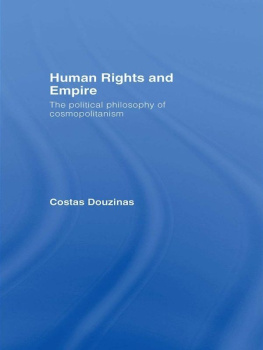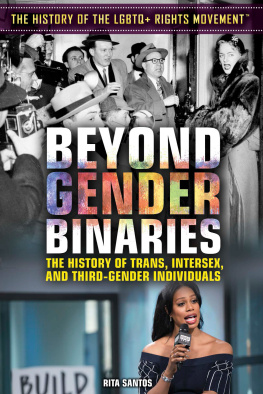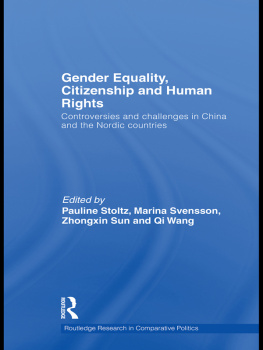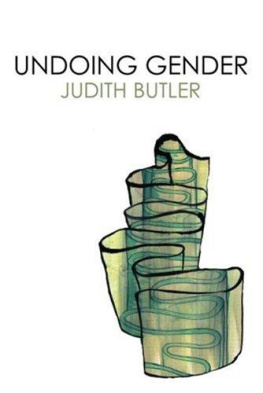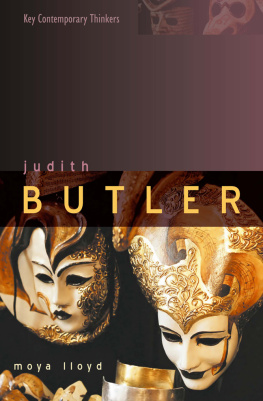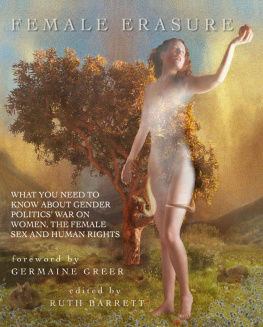
Also by Riki Wilchins
Read My Lips
Genderqueer (with Clare Howell and Joan Nestle)

Copyright 2004 by Riki Wilchins
Magnus Books, an Imprint of Riverdale Avenue Books
5676 Riverdale Avenue, Suite 101
Bronx, NY 10471
First published by Alyson Books In 2004
First Magnus Books edition 2014
All rights reserved. No part of this book may be reproduced or transmitted in any form or by any means, electronic or mechanical, including photocopying, without permission in writing from the publisher.
Printed in the United States of America
Cover design by Cerebral Itch Creative
Layout by www.formatting4U.com
Print ISBN: 978-1-62601-089-5
Digital ISBN: 978-1-62601-088-8
www.magnusbooks.com
www.riverdaleavebooks.com
For GMR
You are my life.
Table of Contents
Preface
Queer Theory, Gender Theory was my third book and easily the one I wrestled with the most: How to take this (over-complicated) theory, inevitably articulated in the most abstruse language, and render everything in high school English anyone could follow illustrated by accessible and often highly personal examples to bring it all to life? Ohand compress it into a single, slim, readable volume?
I rewrote and rewrote it again and again. Which is not to say it wasn't a labor of love. After all, these were writers and ideas that saved my life and (sometimes) sanity. I had long wanted to find a way to share them with others who felt them too abstract and academic to be of any value.
I remember a lunch in Greenwich Village where I kept tryingand failing miserablyto explain to a few friends the latest insight I felt I'd gleaned from Judith Butler's impenetrable prose. I was afire with all the new connections I was making with my own life, but they were incredibly bored and (mostly) tolerant with my frequent interruptions of their meal to discuss one or another piece of postmodern theory. It was as if I was speaking in a foreign language, very loud and very passionately. In retrospect, perhaps I was. In any case I kept thinking there should be a book that explained everything I was struggling so to say. Many years later, finally there was.
So imagine my amused chagrin when an Amazon reviewer of Queer Theory, Gender Theory (yes, writers follow these) faulted me for giving his students who had read it the sense that I knew it all. I would have gladly swapped that false confidence for the incomprehension I instilled in lunch companions.
I am grateful to him and the other academics and students who have helped Queer Theory, Gender Theory find a small but devoted following among those who need or want to understand the relevance of gender theory in their own lives and studies. They were exactly the audience I imagined and hoped for when I began the book years ago.
I would also like to express my deep gratitude to Magnus Books bringing it back into print again. Although the world of gender theory has moved on, many of the ideas the book covers remain relevant today. If you've read this far, you must have some interest in queer theory. So this book was written for you. I hope you enjoy it.
Riki Wilchins
February 2014
Introduction
Nothing in mannot even his bodyis sufficiently stable to serve as the basis for self-recognition or for understanding other men.
Michel Foucault
This is a book Ive been waiting to write for years.
Read My Lips: Sexual Subversion and the End of Gender, which I published in 1997, was the radical autobiography. GenderQueer: Voices from Beyond the Sexual Binary was the anthology.
But through it all, I wrote and re-wrote versions of this book. I produced three, in fact, but none I really liked, and none I could interest a publisher in.
I wanted to write theory and take everything Id learned over the last ten years and argue, dissect, and apply it.
But theoryparticularly queer theoryhad fallen on hard times.
It was only interesting to academics and grad students who enjoyed debating the signifying practices of the prevailing phallogocentric economy, with its inevitable tropes and metaphors of hetero-normativity.
And as queer theory retreated further into academic arcana, it become of increasingly less use to the people who needed it, including psychosexual minorities and activists trying to change society.
I started reading postmodern theory because it captured and explained things Id felt or suspected all my life, but which Id never put into words.
Language had always felt like a poor tool, one that didnt even begin to capture the ways I felt about the world or the things in my head. There seemed to be two worldsthe real one inside my head and the other one that I talked about with others.
I used to wonder what happened to the million things I felt and thought that I could never say, which knowledge and categories and meaning didnt begin to capture.
At the same time, as much as I loved language, I was puzzled by the nave faith everyone has in words. They seem to believe that all these named things really exist, and that anything that isnt named, somehow doesnt.
Words and names wield enormous power. Jewish, white, straight, malewhat did these have to do with me? Why was I supposed to be silent, strong, and masculine? Why dont big boys cry?
I knew I was different. Although I didnt think much about the gender thing, I knew I was different in a way that I wasnt supposed to be, that made me very sad, and that would land me in a lot of trouble if anyone found out.
And I knew someday people would find out. And of course they did.
It was understanding that I could have this very different thing about me, that there were no words for it, and that no one understood it, that made me begin to suspect the hollowness and limitations of what passes for knowledge.
Throughout my teens, I would walk the streets around our house at night, comparing different forms of knowledge (how do Freudian psychology and relativity relate?) in an intense, adolescent haze.
Knowledge should be hard and accessible. Except in a very few instances, it seemed to me more like a net you dropped in the ocean, pulling up some things and leaving lots of others behind.
Or perhaps thats not quite right either. At Coney Island we played an old mechanical arcade game. For four quarters, you got to manipulate a set of pincers on a crane over a heap of chintzy toy prizes. You won one by successfully picking it up, maneuvering it over to you, and dropping it down a chute.
No matter how much you wanted something, no matter how close to you it was, the only way to pick anything up inside that little glass world was with those pincers.
Knowledge seemed like that. The only way to touch something in the world and manipulate it was with thinking tools. And you didnt know anything about the world except what was communicated to you through those pincers.
One summer I went to a summer camp where no one knew I was Jewish. I was just another boy, until my Jewishness came out.
Then everything changed. I got into fights. I became the Jewish kid. For those who had never met a Jew, what I did and said became emblematic: So this is what Jews say and do. It was a very interesting form of knowledge.
Next page

